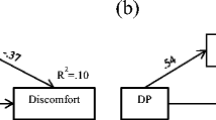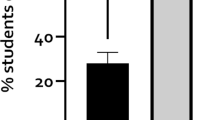Abstract
As a result of the public demand for higher ethical standards, business schools are increasingly taking ethical matters seriously. But their effort has concentrated on teaching business ethics and on students' ethical behavior. Business faculty, in contrast, has attracted much less attention. This paper explores the context and the implications of an alleged case of plagiarism in a master's dissertation submitted to a university lacking both an ethical code of conduct and a formalized procedure to deal with academic misconduct. The events evolved into a bitter political process in which the more ethically aware members of faculty challenged efforts to cover-up. Here the focus is on the motives and behavior of faculty members involved in this case rather than the alleged plagiarist's. The role played by the main actors involved in the process in examined using the theory of moral development and the organizational politic perspective. The paper discusses the mechanisms available to raise ethical awareness and prevent academic misconduct, and the limitations of self-regulation and self-monitoring that prevails in the university system. It also examines the impact of ethics instruction and faculty ethical standards on students' behavior and concludes that ethics instruction can only be effective when the principles taught are in line with daily actions of their instructors.
Similar content being viewed by others
References
Adams, J. S.,A. Tashchian and T. H. Shore: 2001,'Codes of Ethics as Signals for Ethical Behavior',Journal of Business Ethics 29(3), 199–211.
AOM: 1995, ‘The Academy of Management Code of Ethical Conduct', Academy of Management Journal 38(2), 573–577.
Austin, M. J. and L. D. Brown: 1999, ‘InternetPlagiarism: Developing Strategies to Curb StudentAcademic Dishonesty', The Internet and HigherEducation2(1), 21–33.
Baltimore, D.: 1989, ‘Self-regulation of Science',Technology Review 92(6), 20 and 79.
Borkowski, S. C. and Y. J. Ugras: 1998, ‘BusinessStudents and Ethics: A Meta-analysis', Journal ofBusiness Ethics 17(11), 1117–1127.
Braxton, J. M. and A. E. Bayer: 1996, ‘PersonalExperiences of Research Misconduct and theResponse of Individual Academic Scientists',Science, Technology and Human Values 21(2), 198–213.
Brown, V. J. and M. E. Howell: 2001, ‘The Efficacyof Policy Statements on Plagiarism: Do TheyChange Students’ Views?', Research in HigherEducation 42(1), 103–118.
Caruana, A., B. Ramaseshan and M. T. Ewing: 2000,'The Effect of Anomie on Academic Dishonestyamong University Students', The InternationalJournal of Educational Management 14(1), 23–30.
Chubin, D. E. and E. J. Hackett: 1990, Peerless Science:Peer Review and U.S.Science Policy(State Universityof New York Press, Albany).
Coleman, N. and T. Mahaffey: 2000, ‘BusinessStudents Ethics: Selected Predictors of Attitudestoward Cheating', Teaching Business Ethics4(2),121–136.
Collins, D.: 2000, ‘The Quest to Improve the HumanCondition: The First 1500 Articles Published inJournal of Business Ethics', Journal of Business Ethics 26(1), 1–73.
Conaway, R. N. and T. L. Fernandez: 2000, ‘EthicalPreferences among Business Leaders: Implicationsfor Business Schools', Business CommunicationQuarterly 63(1), 23–38.
Crown, D. F. and M. S. Spiller: 1997, ‘FacultyResponsibilities in Dealing with CollegiateCheating: A Student Development Perspective',Teaching Business Ethics1(2), 117–130.
Crown, D. F. and M. S. Spiller: 1998, ‘Learning fromthe Literature on Collegiate Cheating: A Reviewof Empirical Research', Journal of Business Ethics 17(6), 683–700.
Cyriac, K. and R. Dharmaraj: 1994,'Machiavellianism in Indian Management', Journalof Business Ethics 13(4), 281–286.
David, F. R.,L. M. Anderson and K. W. Lawrimore,'Perspectives on Business Ethics in ManagementEducation', SAM Advanced Management Journal 55(4), 26–32.
Davis, J. R. and R. E. Welton: 1991, ‘ProfessionalEthics: Business Students’ Perceptions', Journal ofBusiness Ethics 10(6), 451–463.
Davis, M.: 1999, Ethics and the University(Routledge,London).
Devine, T.: 1998, ‘Secrecy and Accountability in Scientific Research', Forum for Applied Research and Public Policy 13(1), 65–70.
Dotterweich, D. P. and S. Garrison: 1997, ‘ResearchEthics of Business Academic Researchers atAACSB Institutions', Teaching Business Ethics1(4),431–447.
DuPont, A. M. and J. S. Craig: 1996, ‘DoesManagement Experience Change the EthicalPerceptions of Retail Professionals: A Comparison Ethical Misconduct in the Business School 87.of the Ethical Perceptions of Current Students withThose of Recent Graduates?', Journal of BusinessEthics 15(8), 815–826.
Fraedrich, J., D. M. Thorne and O. C. Ferrell: 1994,'Assessing theApplication of Cognitive Moral Development Theory to Business Ethics', Journal of Business Ethics 13(10),829–838.
Frankel, M. S.: 1998, ‘Scientific Community Must Set the Standards', Forum for Applied Research and PublicPolicy 13(1), 57–60.
Frey, R. L.,B. S. Frey and R. Eichenberger: 1999,'A Case of Plagiarism', Kyklos 52(3), 311.
Grayson, L.: 1995, Scientific Deception: An Overviewand Guide to the Literature of Misconduct and Fraudin Scientific Research(The British Library, London).
Grayson, L.: 1997, Scientific Deception: An Update(The British Library, London).
Greenberg, M. and L. Goldberg: 1994, ‘EthicalChallenges to Risk Scientists: An ExploratoryAnalysis of Survey Data', Science, Technology and Human Values 19(2), 223–241.
Grover, S. L. and C. Hui: 1994, ‘The Influence ofRole Conflict and Self-interest on Lying inOrganizations', Journal of Business Ethics 13(4),295–303.
Hannabuss, S.: 2001, ‘Contested Texts: Issues of Plagiarism', Library Management 22(6 /7), 311–318.
Hansen, B. C. and K. D. Hansen: 1989, ‘Challengesto the Integrity of Science: The Federal Mandate and Issues for Institutions', Journal of the Society of Research Administrators 20(4), 5–10.
Kaptein, M. and J. Wempe: 1998, ‘Twelve GordianKnots when Developing an Organizational Code of Ethics', Journal of Business Ethics17(8), 853–869.
Kleiner, D. S. and M. D. Maury: 1997, ‘Thou Shalt and Shalt Not: An Alternative to the Ten Commandments Approach to Developing a Codeof Ethics for Schools of Business', Journal of BusinessEthics 16(3), 331–336.
Lane, M. S.,D. Schaupp and B. Parsons: 1988,'Pygmalion Effect: An Issue for Business Educationand Ethics', Journal of Business Ethics7(3), 223–229.
List, J. A.,C. D. Bailey, P. J. Euzent and T. L. Martin:2001, ‘Academic Economists Behaving Badly? ASurvey of Three Areas of Unethical Behavior',Economic Inquiry 39(1), 162–170.
Loe, T. W.,L. Ferrell and P. Mansfield: 2000, ‘AReview of Empirical Studies Assessing EthicalDecision Making in Business', Journal of BusinessEthics 25(3), 185–204.
Luthar, H. K.,R. A. DiBattista and T. Gautschi:1997, ‘Perception of What the Ethical Climate is and What it Should Be: The Role of Gender,Academic Status, and Ethical Education', Journal ofBusiness Ethics 16(2), 205–217.
Marnburg, E.: 2001, ‘The Questionable Use of MoralDevelopment Theory in Studies of Business Ethics:Discussion and Empirical Findings', Journal ofBusiness Ethics 32(4), 275–283.
McCabe, D. L.,J. M. Dukerich and J. E. Dutton:1994, ‘The Effects of Professional Education onValues and the Resolution of Ethical Dilemmas:Business School vs. Law School Students', Journalof Business Ethics 13(9), 693–700.
McCutchen, C. W.: 1991, ‘Peer Review: TreacherousServant, Disastrous Master', Technology Review 94(7), 28–38.
Moran, G.: 1998, Silencing Scientists and Scholars inother Fields: Power, Paradigm Controls, Peer Review,and Scholarly Communication(Ablex PublishingCorp., Greenwich, CT).
Parrish, D. M.: 1997, ‘Improving the ScientificMisconduct Hearing Process', Journal of theAmerican Medical Association 277(16), 1315–1319.
Peppas, S. C. and B. A. Diskin: 2001, ‘College Courses in Ethics: Do They Really Make aDifference?', The International Journal of Educational Management 15(7), 347–353.
Phillips, M. R. and V. Horton: 2000, ‘Cybercheating:Has Morality Evaporated in Business Education?',The International Journal of Educational Management 14(4), 150–155.
Pizzolatto, A. B. and S. Bevill: 1996, ‘Business Ethics:A Classroom Priority?', Journal of Business Ethics 15(2), 153–158.
Pulvers, K. and G. M. Diekhoff: 1999, ‘TheRelationship between Academic Dishonesty and College Classroom Environment', Research inHigher Education 40(4), 487–498.
Reidenbach, R. E. and D. P. Robin: 1991, ‘AConceptual Model of Corporate MoralDevelopment', Journal of Business Ethics 10(4),273–284.
Rezaee, Z., R. C. Elmore and J. Z. Szendi: 2001,'Ethical Behavior in Higher EducationalInstitutions: The Role of the Code of Conduct',Journal of Business Ethics 30(2), 171–183.
Ryan, K. J.: 1998, ‘Research Fraud and Public Trust',Forum for Applied Research and Public Policy 13(1),50–56.
Salter, S. B.,D. M. Guffey and J. J. McMillan: 2001,'Truth, Consequences and Culture: A ComparativeExamination of Cheating and Attitudes about Cheating among U.S. and U.K. Students', Journalof Business Ethics 31(1), 37–50.
Sauser, W. I. Jr.: 1990, ‘The Ethics of TeachingBusiness: Toward a Code for Business Professors',SAM Advanced Management Journal 55(4), 33–37.
Schwartz, R. H.,S. Kassem and D. Ludwig: 1991,'The Role of Business Schools in Managing the Incongruence between Doing What is Right and Doing What it Takes to Get Ahead', Journal ofBusiness Ethics 10(6), 465–469.
Snapper, J. W.: 1999, ‘On the Web, PlagiarismMatters More than Copyright Piracy', Ethics andInformation Technology1(2), 127–135.
Stevens, B.: 1999, ‘Communicating Ethical Values:A Study of Employee Perceptions', Journal ofBusiness Ethics 20(2), 113–120.
Stevens, R. E.,O. J. Harris and S. Williamson: 1993,'A Comparison of Ethical Evaluations of BusinessSchool Faculty and Students: A Pilot Study',Journal of Business Ethics 12(8), 611–619.
Vinten, G.: 1999, ‘A Whistleblowing Code forEducational Institutions', The International Journal of Educational Management 13(3), 150–157.
Weaver, G. R.,L. K. Treviño and P. L. Cochran:1999, ‘Corporate Ethics Practices in the Mid-1990's:An Empirical Study of the Fortune 1000',Journal of Business Ethics 18(3), 283–294.
Weinstein, D.: 1979, ‘Fraud in Science', Social ScienceQuarterly 59(4), 639–652.
White, C. S. and R. S. Dooley: 1993, ‘Ethical orPractical: An Empirical Study of Students’ Choices in Simulated Business Scenarios', Journal of BusinessEthics 12(8), 643–651.
Woolf, P. K.: 1991, ‘Accountability and Responsibility in Research’, Journal of Business Ethics 10(8),595–600.
Author information
Authors and Affiliations
Rights and permissions
About this article
Cite this article
Cabral-Cardoso, C. Ethical Misconduct In The Business School: A Case Of Plagiarism That Turned Bitter. Journal of Business Ethics 49, 75–89 (2004). https://doi.org/10.1023/B:BUSI.0000013864.76547.d5
Issue Date:
DOI: https://doi.org/10.1023/B:BUSI.0000013864.76547.d5




